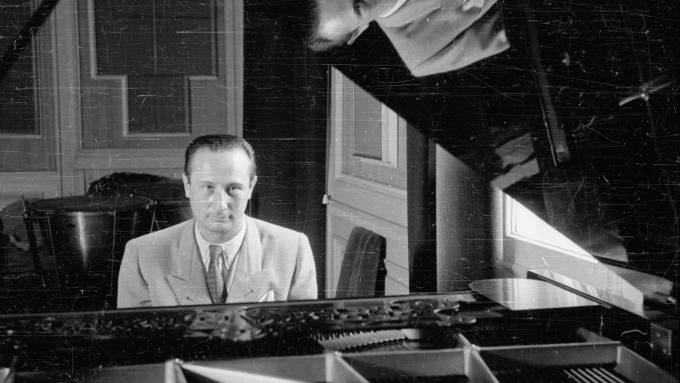Władysław Szpilman is currently the most well-known of the Warsaw Robinsons. How did he survive in German-occupied Warsaw?
by Michał Studniarek
In 1939, Władysław Szpilman resided in the center of Warsaw on Śliska Street with his parents, Samuel and Edwarda, his brother Henryk and his two sisters – Regina and Halina. Władysław was working for the Polish Radio and, on his way home in the evenings, he often observed Warsaw’s preparations for the impending war with Germany.
On 1 September, in the morning, he heard distant explosions, but he thought they were military exercises. His mother finally woke him, saying that war had broken out. Szpilman went to the Polish Radio offices, hoping to learn more about the situation, but the chaos on the spot made it impossible. Over the next few days, the front moved closer to Warsaw. Soon the evacuation of all men to the other back of the Vistula was announced. Nevertheless, Władysław and his father and brother decided to stay with their family. The city was declared a fortress. The Szpilmans moved in with friends living on a lower floor. During the increasingly frequent air raids, the pianist hid in cellars and dug anti-tank ditches on the outskirts of the city. On 23 September, he played live on air for the last time before German shelling damaged the power plant irrevocably. Finally, on 27 September, after two days of continuous bombardment, Warsaw capitulated. The family returned to their apartment, where everything was undisturbed except for a few windows.
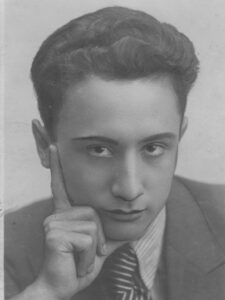
Warsaw adapted to the new living conditions. The first German announcements appeared. Those that applied to the Jewish population ordered them to deposit their valuables in banks and to bow to every German soldier they met. Daily life split into two levels: legal, filled with work for a minimum amount of food, and illegal, based on the risky trade of forbidden goods on the black market. People quickly understood that the stock exchange was more dangerous than the regulations after it plunged suddenly downwards without any warning. The Szpilmans were not faring well, and they began to sell off their property and offered music lessons to earn money. They were also affected by subsequent German orders, such as the one announced in December, that forced them to wear armbands with the Star of David. Szpilman plunged into depression and took the occupation of France by the Germans quite hard. He also tried to avoid physical work (he was afraid of injuring his hand, which would prevent him from continuing his career as a pianist). It was a stroke of luck that the Szpilmans were spared a move to the Ghetto–they already lived within its intended confines. On 15 November 1940, their neighborhood was enclosed by [the Ghetto] wall. In his memoirs, the pianist cited the explanation of the German authorities, published in the “Nowy Kurier Warszawski” for Poles. Within the Ghetto, Jews will be able to live peacefully and develop their culture in isolation. Also, the wall was erected to prevent the spread of typhus and other “Jewish diseases.”
Szpilman became an observer of life in the Ghetto. The community closely followed German actions and the progress of the troops in the USSR, trying to discern the war’s outcome. People lived in fear of an unknown danger that might come from anywhere. Szpilman did not doubt that they were prisoners, which only increased his longing for life on the other side of the wall. A careful interview of neighbors and passers-by preceded each exit from the Ghetto to find out if there was a round-up. The family sold everything they could (including their treasured piano) when the Ghetto was first established, but the money quickly ran out. Szpilman went to Miła Street to gather information provided by the resistance and to talk to anyone who could find a glimmer of hope, even in the worst news. He also helped Henryk sell books. The family would meet at home around the table, where their mother would serve a carefully prepared dinner, and their father would tell comforting news. Władysław worked in the evenings as a pianist in cafes in the Ghetto. While going to work, he sometimes watched the smugglers who brought various goods into the Ghetto, especially food, which was often smuggled n by children. Once, he helped a young smuggler stuck in a hole at the foot of the wall. A gendarme caught the youth, and he died in the arms of the pianist with his spine shattered by the German’s bootheel.
In the cafe where he performed, traders often met with speculators. Soon after, he changed his premises to one where members of the Jewish intelligentsia gathered to socialize and converse. He was appreciated as an artist there and met many people from the world of art and culture. After a few months, he moved to the famous “Sztuka” cafe, where he performed alongside the greatest artists of the Ghetto. Returning home in the evening was the hardest. A typhus epidemic swept the Ghetto in the winter of 1941/1942. Its victims, naked and wrapped in paper, lay on the pavements, waiting to be transported to mass graves. The pianist scurried past them, shining his flashlight so as not to trip. He also saw madmen, such as Rubinstein, who was famous throughout the Ghetto, and the author of the saying “Alle Gleich!” (“All are equal”), and children begging for food.
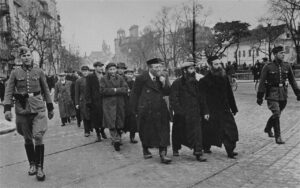
In 1942, Henryk was arrested in one of the round-ups, and it was only thanks to his fame that Władysław managed to save him. In the summer, the Great Deportation Action began. Jews were transported to the Umschlagplatz and then sent by rail to the extermination camp in Treblinka. Everyone sought to obtain a certificate of employment in any German enterprise. Their representative offices sprang up like mushrooms in the Ghetto. Szpilman managed to secure certificates for the whole family after an extreme effort. The family moved to a sorting room for furniture and things taken from abandoned apartments. In mid-August, the family was selected for deportation. Soon, Henryk and Halina joined them at the Umschlagplatz. Initially rescued, they volunteered to leave as soon as they learned of the fate of their other family members. In the evening, a train with cattle cars arrived, and the resigned pianist headed towards them with his family.
However, Szpilman did not board the train. At some point, one of the Jewish policemen recognized him and pulled him out of line. When he desperately tried to return, he heard one of the policemen say: “You better save yourself!” Then Szpilman understood what awaited those in the wagons. He escaped from the square, having mingled with a group of commune workers. The first night he slept with a distant cousin he met on the street who served in the Jewish police.
He was employed in a Kommando, dismantling the walls of the Ghetto. Like the other laborers, he worked as slowly as possible, earning money by trading food bought at the market on the Aryan side. As he later wrote, the awareness of imminent death gave him the strength to save himself. Rumors about further deportations prompted the pianist to seek shelter with Poles. Together with other workers leaving the Ghetto, he smuggled ammunition and grenades in potato sacks for the growing resistance movement. He was afraid he might not survive another selection; fortunately, he was able to communicate with a couple of young artists – the Godlewskis, who provided him with a hiding place in Mokotów. His first refuge was a painting atelier. The next was the apartment of Mr. Lewicki, who was involved in the resistance movement. This hiding place was more tolerable thanks to recitals played by his neighbor on an out-of-tune piano and loud arguments with her husband. The owner visited him twice a week, bringing food, and news from the world. The pianist had to be silent at all times and could not even walk on the creaking floor. His original feeling of euphoria at his escape soon began to give way to doubts, especially after the outbreak of the Ghetto uprising and then when his host notified him that he was being hunted. Szpilman awaited the arrival of the Germans and was tormented by suicidal thoughts. He was ready to hang himself if the Gestapo started pounding on his apartment. Meanwhile, a new guardian appeared who brought very little food and almost starved the pianist to death. As it turned out later, this guardian was an impostor and was being hunted by the Polish underground. Not long after the truth was revealed, suspicious neighbors started pounding on the apartment door; Szpilman took the opportunity to escape into the street.
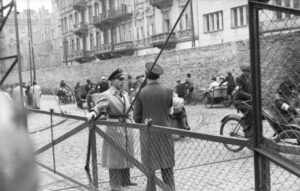
Eventually, friends placed him in an apartment at Aleja Niepodległości 233, located within the zone inhabited by the Germans. They believed that he would be safer hiding in the lion’s den. Szpilman was there when the Warsaw Uprising began. From his window, he could watch the first fights and hear wives say goodbye to their husbands who were leaving to fight. On the second day of the uprising, the liaison officer came for the last time, saying that the Germans had cut off the area from the insurgents. Szpilman had to wait there until they were freed. This is how Władysław Szpilman’s Robinsonade began.
When the Germans set fire to the house, Szpilman escaped to the attic. He decided to commit suicide by taking all the sleeping pills he had. However, he did not fall asleep forever. Instead, he woke up after a few hours. The pills must have been too old. Nevertheless, the joy Szpilman experienced when realizing he was still alive made this his last suicide attempt. From then on, Szpilman decided he would do everything he could to survive.
For several days, he hid in the unfinished hospital building opposite and then returned to the burnt walls. He saw columns of insurgents held captive by the Germans and expelled civilians. He changed his residence several times and developed a daily plan of repeating English words and songs he had played before. Some Germans who caught him in the ruins once gave him half a liter of spirit; when they came again, he hid on the roof, but the Germans found him there too. He hid in other burnt-out houses in the area. He tried to find out something about the situation in Warsaw from a group of laborers on their way to work. However, the instinct that had saved his life several times already advised him not to stick around. Following the conversation, Szpilman took refuge in a different house. Less than ten minutes later, the foreman returned with German policemen, and they searched the house where he had been staying. After this meeting, Szpilman did not go outside for two more days to be sure he was safe.
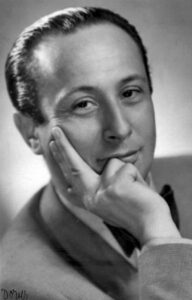
While looking for supplies in an abandoned kitchen, he was caught by a German officer from the Warsaw Defense Staff who was moving into the building. After a short conversation, the German learned who Szpilman was and why he was hiding. The officer told him to play the piano in the room. Later, he showed him a hiding place in the attic and advised him to move into the mezzanine above the entrance. “Are you German?” Szpilman asked, in disbelief. “Yes. Unfortunately, I am a German,” replied the officer, “I have seen what is happening in Poland, and I am very ashamed of my nation.”
The officer visited him in this hideout a few more times, bringing bread, a [sleeping] cover, and newspapers, the reading of which lifted the pianist’s spirits. He also gave him a German military coat so that he could go out to fetch water. During their last meeting in December, the officer announced that he was leaving the city with his unit and told Szpilman to stay strong, saying, “The war will be over by spring.” However, he did not want to accept the pianist’s watch as a thank you, so the pianist gave him his name and place of work, “Szpilman, Polskie Radio.” As Szpilman wrote later, this was “the only man in a German uniform whom I encountered.”
The pianist spent a sad Christmas and New Year in his hideout. On 14 January, he heard the first bursts of fire from across the Vistula river. The Germans were leaving the city in a hurry. By the next day, the Nazis had left Warsaw without a fight. When Szpilman tried to leave his hideout, a passing woman mistook him for a German, and a Polish soldier standing nearby began shooting. Frightened, Szpilman fled to the attic, and two army units surrounded the house. He eventually convinced one of the Polish officers that he was not German, which they confirmed by searching him. Then Szpilman tried to fulfill the vow he had made to himself long ago — to hug the first Pole he met after liberation. It was not easy, and the officer refused as much as possible. When the embrace was over, he handed Szpilman a pocket mirror [to see his ragged appearance] saying: “Appreciate my patriotism!”
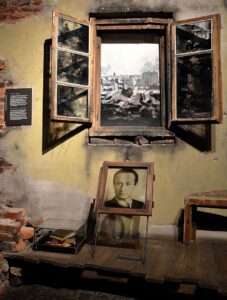
The musician spent his first day of freedom at a Polish military post. Later he went to Targowa street, the temporary seat of the Polish Radio. He would resume his music career at the radio station. The first piece he played live was the same Chopin piece he had played so long ago in 1939. He learned the name of his savior in 1950 thanks to another man who also owed his life to him. Unfortunately, however, it turned out that the Soviets took Captain Wilm Hosenfeld prisoner. Although Szpilman tried to intervene, even with the eminence grise of the communist authority, Jakub Berman, he could not be saved. Hosenfeld died in a Soviet camp in 1952.
Almost immediately after liberation, Szpilman began writing down his memories of the war. As he said, everything was fixed in his memory exceptionally strongly. A well-known music critic, Jerzy Waldorff, assisted with developing the text. Initially, they were serialized in the weekly “Przekrój”, and then published in 1946 for the first time under the title “The death of the city.” In 1998, Władysław Szpilman’s son published the book in a revised form in German (Das Wunderbare Überleben), Polish (“Cudowne Ocalenie”) and English (The Pianist), a new version in Polish was published in 2000. The book became a bestseller. In addition, Roman Polański made a famous film that received several Oscars and the Golden Palm. Unfortunately, Władysław Szpilman did not live to see the premiere – he died in 2000. In 2007, Hosenfeld’s son accepted the Commander’s Cross of the Order of Polonia Restituta in Warsaw on his father’s behalf. Two years later, in Israel, Hosenfeld was awarded the title “Righteous Among the Nations.”
Author: Michał Studniarek
Translation: Alicja Rose & Jessica Sirotin

